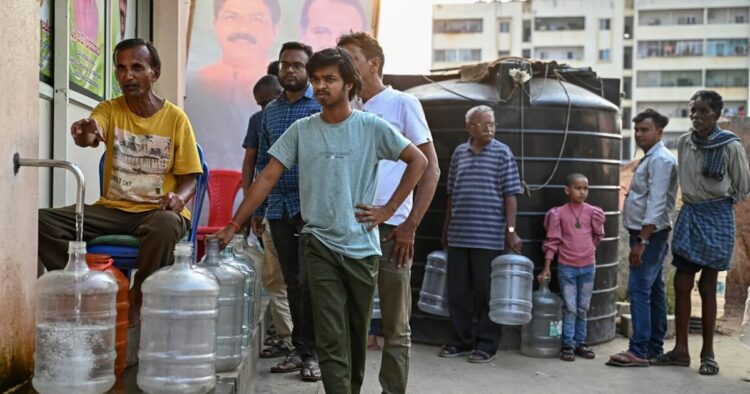In response to the severe water scarcity gripping Bengaluru, residents have been compelled to adopt unconventional measures to cope with the situation. The city, known as Bharat’s ‘silicon valley,’ is grappling with a water crisis of significant proportions, prompting individuals to find innovative solutions to address their daily needs.
One notable adaptation involves the utilization of toilets in malls by residents, as a means to manage their personal hygiene amidst the water shortage. With access to water becoming increasingly limited, this unconventional approach has emerged as a practical solution for many Bengaluru inhabitants.
Furthermore, in a bid to conserve water, residents have opted to work from home, minimizing their reliance on office facilities and reducing the need for water-intensive activities such as cooking at home. The adoption of a work-from-home model has become a prevalent strategy among professionals seeking to navigate the challenges posed by the ongoing water crisis.
Similarly, educational institutions have implemented measures to mitigate the impact of the water shortage on their operations. Some schools have transitioned to online classes, allowing students to continue their studies remotely during this period of emergency. This shift mirrors the adjustments made during the Covid-19 pandemic, demonstrating the adaptability of Bengaluru’s educational sector in the face of adversity.
The impact of the water crisis extends beyond residential and educational settings, affecting commercial establishments as well. Eateries across the city are considering the use of disposable cups, glasses, and plates as a means to reduce water consumption in their operations. By adopting disposable alternatives, these establishments aim to minimize their environmental footprint while addressing the challenges posed by the water shortage.
Moreover, individuals have altered their daily routines to accommodate the scarcity of water. Residents are now showering on alternate days and relying on paper plates to reduce water usage in activities such as cooking and cleaning. Additionally, some have opted to order food from restaurants instead of cooking at home, further conserving water resources in their households.
The water crisis has also impacted schools, with some struggling to provide adequate water facilities to students and staff during class hours. While efforts have been made to address the issue, challenges persist, particularly in ensuring access to water for essential needs such as sanitation.
In conclusion, the water crisis in Bengaluru has prompted residents to adopt innovative strategies to cope with the scarcity of water. From utilizing mall toilets to transitioning to work from home and implementing disposable alternatives, individuals and institutions are demonstrating resilience and adaptability in the face of this challenging situation.

















Comments